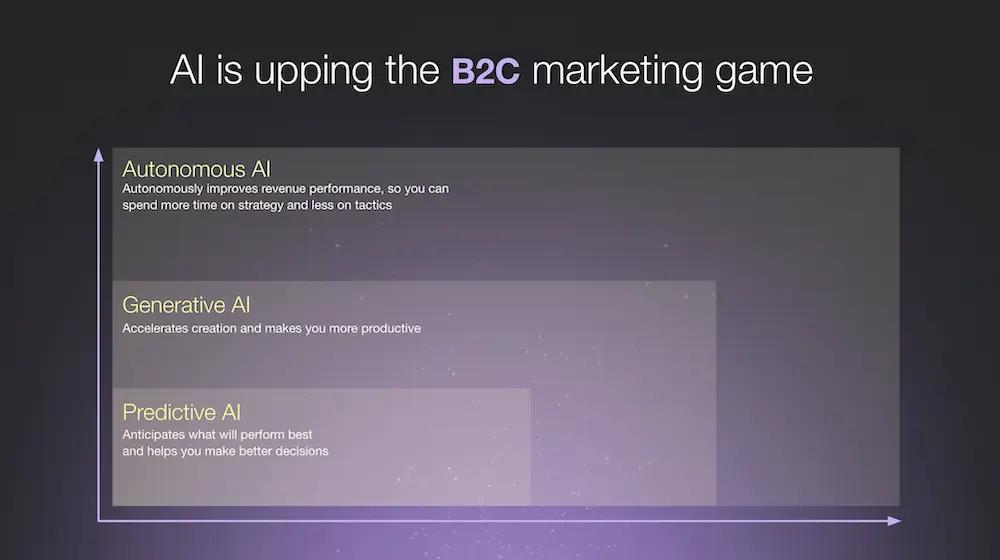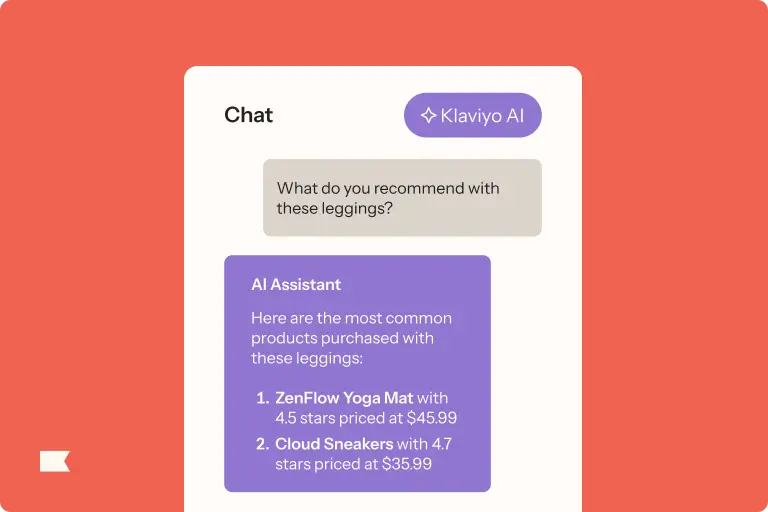What saves you time and helps you get the most out of your customer data—without kicking you out of the driver’s seat?
If you answered “artificial intelligence,” you’re only half right.
Headlines abound about the newest ChatGPT or generative AI features—but only some of those features are revolutionizing the way marketers work.
When implemented effectively, AI is an indispensable marketing tool for building smarter digital relationships.
I trust and value the AI functionality in Klaviyo because it saves me time, it helps me leverage our customer data to personalize our email timing and strategies, and, most importantly, I maintain complete control over how and when it’s used.
“I trust and value the AI functionality in Klaviyo because it saves me time, it helps me leverage our customer data to personalize our email timing and strategies, and, most importantly, I maintain complete control over how and when it’s used,” says Troy Petrunoff, senior retention marketing manager at Every Man Jack.
For marketers, the efficiency and effectiveness gains of AI are most closely tied to speed and scalability. But breaking through the buzz that surrounds AI—and understanding exactly what it can do for your business—isn’t easy.
Let’s break down a few specific ways AI improves the customer experience and increases revenue—while lowering the barrier to entry for high-quality, high-converting personalization.
Becoming better marketers: why speed counts
Today’s consumers have limited budgets and countless options for competing products or services. They also have shorter attention spans, in part due to the many distractions in their digital lives.
“Consumers are spending less and less time deciding whether a product or piece of content is something they like or want,” says Andrew Bialecki, co-founder and CEO of Klaviyo. “Speed matters. Being able to measure and experiment quickly matters. The question for marketers isn’t just how you build smarter digital relationships, but how do you do that quickly.”
Speed matters. Being able to measure and experiment quickly matters. The question for marketers isn’t just how you build smarter digital relationships, but how do you do that quickly.
To help, AI accelerates just about every aspect of marketing automation. It handles basic tasks like setting up email formats and building segments for personalization faster and more efficiently than a human being, which frees you up to devote more time and energy to campaign strategy and execution.
AI also speeds up your learning process by helping you run tests faster, extract more ideas, and experiment—all leading to faster marketer maturity and expertise.
“I’ve been a team of one for most of my career at Made In. Having Klaviyo and their resources at my disposal really helps to spend less time within the platform, more time strategizing and then executing,” says Don Smolik, director of lifecycle marketing at Made In. “That’s a big help for us in the chaotic startup world.”
Personalization for all: where scale really matters
AI also enables large-scale 1:1 personalization in customer communications. During BFCM 2023, messages sent through Klaviyo that were personalized with dynamic content earned 17% higher average click rates and 40% higher average order conversion rates than non-personalized messages.
Roughly 616M messages sent through Klaviyo, meanwhile, included product recommendations personalized by Klaviyo AI, which sifted through historical and behavioral data to calculate 39.2B candidate products as recommendations before filtering them down to the most relevant ones.
This type of AI recommendation engine is an example of work that a human couldn’t do—at least not within the timeframe AI was able to accomplish it.
Of course, this kind of work increases conversion and drives revenue, and improves the customer experience. It also levels the retail playing field—allowing brands of all shapes and sizes to deliver personalized messaging at scale in a way that only the retail giants could resource otherwise.
Machines or humans: why not both?
All that said, AI still isn’t a replacement for human creativity and controls. Across the various stages of marketing automation and campaign development, balancing AI with human-led creativity is what ultimately determines success.
Unfortunately, there are no hard and fast rules to guide you through these situations. Part of the decision-making process is instinctive and based on your deep knowledge of your customers. The other part you learn from cumulative experience using technology you can trust.
Take Every Man Jack as an example. The men’s personal care brand uses Klaviyo AI and integrations to:
- Implement AI-powered re-stock reminders: Soon, they’ll start sending those reminders in a Klaviyo flow (complete with links to a pre-filled Rebuy cart), triggered by a customer’s predicted next order date.
- Segment via quiz-based personalization: Every Man Jack’s scent recommendation quiz collects zero-party data and saves it to respondents’ Klaviyo profiles via the Digioh integration, so the team can segment by preference.
- Launch branded, Klaviyo-powered order updates: Every Man Jack sends order updates through Klaviyo, using the Wonderment integration. The high click rate on these ultra-relevant emails boosts the brand’s overall sender reputation—unlike Shopify order updates.
“Klaviyo’s integrations and AI allow me to weave a very intricate web,” says Petrunoff.
That web is powered by AI, yes, but more fundamentally by data depth and breadth. In Klaviyo, brands collect a lifetime’s worth of clicks; visits; add-to-cart events; purchases; email, SMS, and push opens; and more—and all of that data powers Klaviyo AI’s content generation, predictions, and recommendations.
Our vision is to build fully guided software in which Klaviyo AI identifies revenue-generating opportunities, builds the right content and segmentation, sets up and manages testing, and waits for approval by the marketer.
“Our vision is to build fully guided software in which Klaviyo AI identifies revenue-generating opportunities, builds the right content and segmentation, sets up and manages testing, and waits for approval by the marketer,” explains Jessica Schanzer, lead product marketing manager at Klaviyo.
The brands leading the pack today are the ones using predictive, generative, and autonomous AI not only to save time executing today’s vision, but also to build tomorrow’s strategy. Klaviyo AI does the thinking and heavy lifting for you, so you can focus on driving more revenue for your business.

Schanzer adds, “We want AI to guide your marketing to its fullest potential and best performance.”
Learn why clean customer data is integral to the development of artificial intelligence and machine learning in martech platforms.
Get the scoopGetting started with AI now
As the AI landscape continues changing at a dizzying rate, how do you separate the smoke and mirrors from products that represent a viable long-term solution?
Having the right technology and tools on your side is a big part of the conversation. With Klaviyo, you can get started testing AI for yourself right now.
Here’s a peek at Klaviyo’s most recent AI updates:
- Segments AI: Describe the people you want to reach and AI creates a segment for you.
- Email AI: Get on-brand subject lines or blocks of content for emails.
- SMS AI: Use AI to create entire SMS campaigns and to generate SMS replies.
- Reviews AI: Provide AI-suggested headlines so shoppers can submit their review faster, and make replying to reviews easier with AI-written drafts.
- Forms display optimization: AI tests multiple versions of your form to find the highest-converting display time.
Power smarter digital relationships with Klaviyo SMS.
Get started



